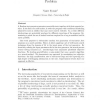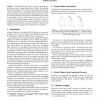602 search results - page 54 / 121 » Unsupervised Problem Decomposition Using Genetic Programming |
120
click to vote
GECCO
2003
Springer
15 years 7 months ago
2003
Springer
The performance of genetic programming relies mostly on population-contained variation. If the population diversity is low then there will be a greater chance of the algorithm bein...
106
click to vote
ENTCS
2006
15 years 2 months ago
2006
A Random test generator generates executable tests together with their expected results. In the form of a noise-maker, it seeds the program with conditional scheduling primitives ...
139
click to vote
NC
1998
15 years 3 months ago
1998
In this paper we introduce an efficient implementation of asynchronously parallel genetic algorithm with adaptive genetic operators. The classic genetic algorithm paradigm is exte...
128
Voted
CP
2009
Springer
15 years 9 months ago
2009
Springer
Abstract. The global cumulative constraint was proposed for modelling cumulative resources in scheduling problems for finite domain (FD) propagation. Since that time a great deal ...
116
click to vote
ECAI
2010
Springer
15 years 3 months ago
2010
Springer
Nested Monte-Carlo search is a general algorithm that gives good results in single player games. Genetic Programming evaluates and combines trees to discover expressions that maxim...




